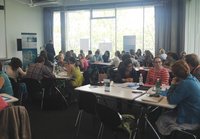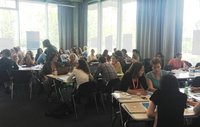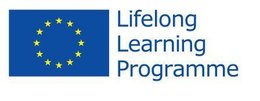IntlUni: What’s been Achieved and the Way Forward
Perched on the hills above Lac Léman on the Franco-Swiss border, Lausanne University, our host venue for the 4th IntlUni All-Partner Meeting, proved an ideal place to review how far the project has come and to consider what still lies ahead. We were at the heart of Europe, the midpoint of the project had been passed and WP4, constituting the core development phase of the project, was well underway.
2014.06.24 |

Words of welcome, Vice-rector for Research and Internationalisation Prof Philippe Moreillon

Status of IntlUni, IntlUni Coordinator Karen M. Lauridsen

WP4: From best practice to principles for quality - by Kevin Haines, Stacey Cozart and Thomas Vogel - Work Packages Leaders

Group work session

Good discussions among the partners

Brigitte Forster-Vosicki presents the LLP project, MAGICC

Lac Léman
As determined at our launch meeting at Aarhus, the complex set of issues facing HEIs in the more fluid post-Bologna era required a re-conceptualization of the university teaching and research environment. To this end, we had conceived of the emergent Multilingual and Multicultural Learning Space (M&MLS) as the conceptual site where we would set about identifying a wide variety of innovative and sustainable strategies aimed at addressing potential challenges. Thanks to all the survey questionnaire responses and follow-up interviews submitted by our partner institutions, as well as the research undertaken by WP2-3 and presented at the Warsaw and Essex All-Partner Meetings, a rich data set has emerged and this is currently being developed further by WP4.
The present phase thus marks a not inconsiderable milestone in the development of the project as – under the auspices of WP4 leaders Stacey Cozart, Kevin Haines and Thomas Vogel – the results from the data input of 39 participants are now finally crystallizing into a frame of reference detailing successful HEI language practices both in and beyond Europe. From this frame of reference and with a view to generally enhancing the quality of teaching and learning in the M&MLS, WP4 have produced a set of five guiding principles cross-referenced to the original data. This they were able to achieve in the period between the preparatory MC and WP-leader meetings chaired by project coordinator Karen M. Lauridsen at Copenhagen on February 10th-12th and again at Lausanne on May 20th-21st.
With 36 partner institutions present on May 22nd, a welcoming speech by Lausanne’s Vice-President for Research and Internationalization formally opened the 4th IntlUni All Partner Meeting. A biologist by training, Prof. Philippe Moreillon wittily and eruditely made the case for the interdisciplinary, not to say universal relevance of our project with regard to bridging cultural and linguistic divides. Then it was down to the business of the day with an intensive round of presentations, discussions and workshop sessions aimed at clarifying and validating the research findings so far.
As Kevin, Stacey and Thomas had stated in their draft document circulated prior to Lausanne, the M&MLS is distinguished from any other educational environment “by the use of an academic lingua franca, by students with different knowledge systems and diverse ethnic, academic, disciplinary and linguistic backgrounds”. Briefly, the five guiding principles relevant to the M&MLS are:
- A safe, learning-conducive environment.
- Leveraging the diversity among students to develop intercultural competences and knowledge.
- Getting lecturers to focus and reflect on the teaching and learning processes in the international classroom.
- Enriching student identities.
- Broadening the students’ knowledge base.
The WP4 leaders emphasized that their overview was not exhaustive and that part of the work in this all-partner meeting was to find out what participants thought was missing in the framework. Hence, seven diverse groups were tasked with presenting, in poster form, their view of the project outcomes so far. We were also asked to reflect on the core messages we would take back to our respective partner institutions. On the basis of the presentations and discussions, a follow-up synthesis report on successful practice with generic case examples will be prepared by WP4 and the first set of quality criteria will be its result.
As the day and the main part of the all-partner meeting drew to a close, we looked outward and forward. Underscoring the pivotal, timely nature of IntlUni with regard to cognate projects, Karen had invited Brigitte Forster-Vosicki, the project coordinator of a parallel LLP project, MAGICC (Modularizing Multilingual & Multicultural Academic Communication Competence for BA and MA level), to present her research findings. Further, Anne-Marie Barrault-Méthy announced a call for conference papers at Bordeaux (MALP 2014: Micropolitical Approaches in Language Policy). With a view to maximizing impact in the upcoming phase, and furnished with updated presentation materials from Karen and IntlUni project manager Mette Kastberg Lillemose, it was clear that we were now being asked to communicate beyond our own immediate language-teaching communities and to reach out to university policy makers and programme directors. From now until the 5th All-Partner Meeting in Braga, Portugal, it is the role of partner representatives to approach key decision-makers within their institutions and to invite them along with a view to eliciting more involvement from policy-makers.
The final morning session on the 23rd was given over to organizational and administrative aspects. Apart from underlining the importance of time sheets and the potential pitfalls of ever more stringent EU audits, Mette and Karen informed us that, as far as the running of the project was concerned, we were on target regarding tasks, logistics, and budget.

